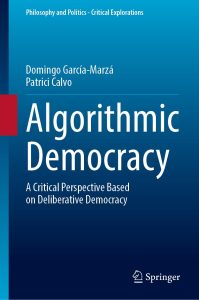New book published
La algoritmización se ha convertido en la principal respuesta de los gobiernos frente a los retos y desafíos de nuestras democracias. Los bots sociales y políticos, especialmente su versión generativa, colonizan la esfera pública con contenidos sintéticos que pervierten y distorsionan tanto la realidad como la opinión pública. Los políticos virtuales se postulan como candidatos en elecciones presidenciales y municipales (Rusia, Dinamarca, Japón, Nueva Zelanda), prometiendo neutralidad, exhaustividad y justicia frente el sesgo egoísta que caracteriza la toma de decisiones humanas. Los gemelos virtuales se exhiben como la forma más eficaz de afrontar la desafección participativa y la mejora de los sistemas democráticos representativos. Y las plataformas digitales y los ecosistemas ciberpolíticos que ofrecen se constituyen como los pilares que sustentan las estructuras de la gobernanza política, convirtiéndose en los actuales grandes centros de despotismo.
Las consecuencias de tales excesos algorítmicos se empiezan a sentir en forma de un aumento exponencial de la percepción de obsolescencia humana, de la vulnerabilidad de los sistemas y las sociedades y entropía social, de la instrumentalización de las esferas funcionales de la sociedad y sus instituciones, de la automatización de las injusticias, de la irresponsabilidad política, del despotismo e imperialismo tecnológico, de la penuria moral entre la ciudadanía más vulnerable, de la desconfianza en lo humano, entre otras muchas cosas.
Según estudios al respecto, detrás de todo ello subyace el interés particular de organismos gubernamentales y grandes tecnológicas. Estos utilizan su enorme poder para diseñar, promover y difundir algoritmos inteligentes con el objetivo de satisfacer fines estratégicos y altamente instrumentales, como mantener o acrecentar el poder, controlar la ciudadanía, someter a la sociedad, manipular el voto, amordazar la opinión pública, provocar consumos compulsivos, etcétera.
Uno de los principales problemas, es que la IA lleva una década metiéndose en las calles, las casas, los coches, los cuerpos, etc. mediante aparatos inteligentes que recopilan datos privados e íntimos para las grandes corporaciones gubernamentales y tecnológicas: robots, teléfonos móviles, altavoces, relojes, gafas, cámaras, auriculares, ordenadores, chips RFID y otros muchos aparatos tecnológicos dotados o vinculados con IA. Y cuantos más datos tiene la IA, más vulnerables se vuelven las personas, las sociedades y las distintas esferas funcionales que, como la democracia, ésta utiliza para proyectarse y desarrollarse una vida buena en relación con los demás. Con estos datos, la IA genera discursos sintéticos capaces de segregar a sus intereses la voluntad libre del consumidor o electorado, unos intereses que, evidentemente no son de los algoritmos, sino de aquellas corporaciones gubernamentales y tecnológicas que los diseñan y difunden con el objetivo de satisfacer sus fines estratégicos e instrumentales.
Otro problema fundamental, es que la esfera pública, el lugar donde la ciudadanía utiliza el diálogo y la deliberación para llegar a acuerdos sobre el sentido de distintas cosas de la democracia, como la legitimidad de las acciones y decisiones de un gobierno, se ha ido desplazando hacia el mundo digital (como las redes sociales). Este desplazamiento ha permitido la hibridación entre lo humano y lo no humano y su colonización algorítmica, facilitando con ello la posible injerencia de los gobiernos y grandes corporativas a través de contenidos sintéticos masivos, cámaras de eco, filtros burbuja, etcétera, que producen campos de distorsión de la realidad.
La guerra de la franja de Gaza es un claro ejemplo de todo ello. Ambos bandos en conflicto han utilizado la IA generativa para manipular la opinión pública mediante paquetes de datos sintéticos que reproducen información con un alto contenido emocional que ha despertado conciencias y producido rechazo de la sociedad internacional hacia un grupo u otro. La aplicación de ese potencial disruptor y distorsionador de la IA Generativa en un super año electoral como 2024, donde 74 países de todo el mundo van a elegir sus representantes, puede tener impactos altamente corrosivos para la democracia a escala global.
Asimismo, también destacan el problema de la reducción de los espacios de libertad. La potencialidad de las democracias algorítmicas se basa en la producción, recopilación y explotación de los datos masivos de la sociedad digitalmente hiperconectada. Para ello, aplican políticas de vigilancia masiva (Mass survellance). Se trata de la implantación por parte de los estados de miles o millones de cámaras, sensores y otros tipos de artefactos de vigilancia conectados a una inteligencia artificial en el espacio público, y, en algunos casos, también privado. A través de este despliegue tecnológico, los gobiernos ejercer un control sobre la ciudadanía cada vez más férreo y opresor, produciendo con ello una espiral de silencio que ralentizo o impide la regeneración, desarrollo y buena salud de las democracias modernas
A pesar de todo, los autores estudios no abogan por paralizar el desarrollo de la IA, sino por gobernarlo. Por un lado, apuestan por promover una sociedad civil fuerte y un desacoplamiento de la esfera pública y la esfera digital que permita recuperar la relacionalidad, la crítica y el acuerdo sobre las acciones y decisiones políticas y los distintas procesos democráticos. La opinión pública es clave para el progreso y la buena salud de las instituciones y organizaciones democráticas, y con ello, del desarrollo de la sociedad. Por otro lado, apuestan por desarrollar, aplicar e implementar instrumentos y mecanismos de autorregulación para la gobernanza ética de la Democracia algorítmica, como los códigos de ética y conducta para orientar su diseño y explotación, los canales de ética para alertar o denunciar casos de mala praxis, las auditorías éticas para comprobar su correcto funcionamiento, o los informes de responsabilidad y explicabilidad para rendir cuentas a la sociedad de sus usos e impactos.


